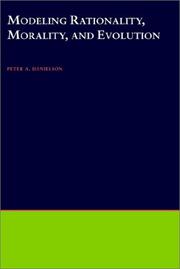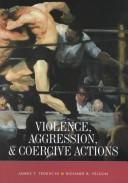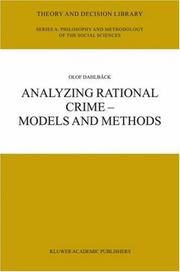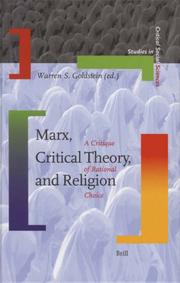| Listing 1 - 8 of 8 |
Sort by
|
Multi
ISBN: 0521238625 9780521238625 9780521122559 0521122554 9780511897993 0511897995 Year: 1983 Publisher: Cambridge: Cambridge university press,
Abstract | Keywords | Export | Availability | Bookmark
 Loading...
Loading...Choose an application
- Reference Manager
- EndNote
- RefWorks (Direct export to RefWorks)
Left freely to themselves, a group of rational individuals often fail to cooperate even when the product of social cooperation is beneficial to all. Hence, the author argues, a rule of collective decision making is clearly needed that specifies how social cooperation should be organised among contributing individuals. Suzumura gives a systematic presentation of the Arrovian impossibility theorems of social choice theory, so as to describe and enumerate the various factors that are responsible for the stability of the voluntary association of free and rational individuals. Among other topics covered are an axiomatic characterisation of the concept of a rational choice, the simple majority decision rule and its extensions, the social choice implications of the concept of equity as nonenvy, the constrained majoritarian collective choice rules and the conflict between the Paretian ethics and the libertarian claims of individual rights.
Microeconomics --- Social choice --- Welfare economics --- 316.45 --- 316.323.65 --- Economic policy --- Economics --- Social policy --- Choice, Social --- Collective choice --- Public choice --- Choice (Psychology) --- Social psychology --- Sociale groepen. Groepsprocessen. Kleine groepen. Interactionele groepsdynamiek --- Verzorgingsstaat. Welvaartsstaat --- Social choice. --- Welfare economics. --- Economía del bienestar --- Kollektiventscheidung. --- Rationalität. --- Wohlfahrtstheorie. --- Économie du bien-être. --- Choix collectif. --- bien-être --- Fürsorge. --- choix rationnel (théorie) --- modèle mathématique. --- 316.323.65 Verzorgingsstaat. Welvaartsstaat --- 316.45 Sociale groepen. Groepsprocessen. Kleine groepen. Interactionele groepsdynamiek --- Economía del bienestar. --- Bien-être --- Choix rationnel (théorie) --- Modèle mathématique. --- Business, Economy and Management

ISBN: 0333710797 Year: 2000 Publisher: Houndmills Basingstoke London Macmillan Press
Abstract | Keywords | Export | Availability | Bookmark
 Loading...
Loading...Choose an application
- Reference Manager
- EndNote
- RefWorks (Direct export to RefWorks)
Choix rationnel [Théorie du ] --- Keuzetheorie [Rationele ] --- Rational choice theory --- Rationele keuzetheorie --- 339.92 --- European Union --- -Rational choice theory --- #SBIB:35H411 --- #SBIB:327.7H220 --- Social choice --- Economische samenwerking en integratie. Tolunie --- Decision making --- Beleidscyclus: voorbereiding (inclusief planning) --- Europese Unie: instellingen en besluitvorming --- Rational choice theory. --- 339.92 Economische samenwerking en integratie. Tolunie --- E.U. --- Decision making. --- Union européenne

ISBN: 0195125509 9780195125504 Year: 1998 Volume: 7 Publisher: New York (N.Y.): Oxford university press,
Abstract | Keywords | Export | Availability | Bookmark
 Loading...
Loading...Choose an application
- Reference Manager
- EndNote
- RefWorks (Direct export to RefWorks)
Ethics --- Rational choice theory --- Ethics, Evolutionary --- Prisoner's dilemma game --- Ethics, Evolutionary. --- Prisoner's dilemma game. --- Rational choice theory. --- Choix rationnel [Théorie du ] --- Decomposed prisoners' dilemma game --- Dilemma van de gevangene (Spel) --- Ethics [Evolutionary ] --- Ethics [Naturalistic ] --- Ethiek --- Ethique --- Ethique évolutionniste --- Evolutionary ethics --- Evolutionisme in de ethiek --- Evolutionistische ethiek --- Evolutionnisme en éthique --- Jeu du dilemme du prisonnier --- Keuzetheorie [Rationele ] --- Naturalistic ethics --- Rationele keuzetheorie

ISBN: 019926550X 0199248060 1282052675 9786612052675 0191530182 0191597368 9780199248063 Year: 2001 Publisher: New York (N.Y.): Oxford university press,
Abstract | Keywords | Export | Availability | Bookmark
 Loading...
Loading...Choose an application
- Reference Manager
- EndNote
- RefWorks (Direct export to RefWorks)
Dupré warns that our understanding of human nature is being distorted by two faulty and harmful forms of pseudo-scientific thinking. He claims it is important to resist scientism - an exaggerated conception of what science can be expected to do.
Philosophy of science --- Choix rationnel [Théorie du ] --- Keuzetheorie [Rationele ] --- Rationele keuzetheorie --- -Rational choice theory --- Genetic psychology. --- Human beings --- Rational choice theory. --- Science --- Philosophy. --- Genetic psychology --- Rational choice theory --- Social choice --- Human genetics --- Psychology --- Normal science --- Homo sapiens --- Human race --- Humanity (Human beings) --- Humankind --- Humans --- Man --- Mankind --- People --- Hominids --- Persons --- Philosophy --- Human beings - Philosophy. --- Science - Philosophy.

ISBN: 1557982570 Year: 1994 Publisher: Washington, DC Hyattsville, MD American Psychological Association May be ordered from APA Order Dept.
Abstract | Keywords | Export | Availability | Bookmark
 Loading...
Loading...Choose an application
- Reference Manager
- EndNote
- RefWorks (Direct export to RefWorks)
Aggression (Psychology) --- Aggressive behavior --- Aggressiveness --- Aggressiveness (Psychology) --- Agressie (Psychologie) --- Agression (Psychologie) --- Agressiviteit --- Agressiviteit (Psychologie) --- Agressivité --- Agressivité (Psychologie) --- Caractère agressif --- Choix rationnel [Théorie du ] --- Comportement agressif --- Geweld --- Interaction sociale --- Keuzetheorie [Rationele ] --- Rational choice theory --- Rationele keuzetheorie --- Social interaction --- Sociale interactie --- Tempérament agressif --- Violence --- #PEDA *6.585 --- #PEDA *P 7.91 --- Psychology --- Defensiveness (Psychology) --- Fighting (Psychology) --- Toughness (Personality trait) --- Violent behavior --- Social psychology --- Human interaction --- Interaction, Social --- Symbolic interaction --- Exchange theory (Sociology) --- Social choice --- Aggressiveness. --- Rational choice theory. --- Social interaction. --- Violence. --- Social Change --- Sociology & Social History --- Social Sciences

ISBN: 0521574943 0521573653 0511600887 Year: 1997 Publisher: New York Cambridge ; Melbourne Cambridge University Press
Abstract | Keywords | Export | Availability | Bookmark
 Loading...
Loading...Choose an application
- Reference Manager
- EndNote
- RefWorks (Direct export to RefWorks)
This work, sequel to the author's Theories of Civil Violence, attacks questions that have long troubled social science and social scientists - questions of the cumulative nature of social inquiry. Does the knowledge generated by the study of social, political, and economic life grow more comprehensive over time? These questions go to the heart of social scientists' soul-searching as to whether they are indeed engaged in 'science'. The author pursues these questions through in-depth examination of various theoretical programs currently influential in social science, including feminist social science, rational choice theory, network analysis and others.
Behavioral sciences --- Choix rationnel [Théorie du ] --- Feminism--Philosophy --- Feminist sociology --- Feminist theory --- Feministische theorie --- Keuzetheorie [Rationele ] --- Progress --- Progrès --- Rational choice theory --- Rationele keuzetheorie --- Science sociale --- Sciences [Social ] --- Sciences sociales --- Social science --- Social sciences --- Social studies --- Sociale wetenschap --- Sociale wetenschappen --- Theory of feminism --- Théorie féministe --- Vooruitgang --- Social sciences. --- Progress. --- Rational choice theory. --- Feminist theory. --- Choix rationnels, Théorie des --- Progrès --- Choix rationnels, Théorie des --- Théorie féministe --- Social Sciences --- Sociology --- Feminism --- Feminist philosophy --- Social choice --- Social progress --- Civilization --- Regression (Civilization) --- Social stability --- Human sciences --- Sciences, Social --- Philosophy

ISBN: 1402016573 9048164419 9401707219 Year: 2003 Volume: 36 Publisher: Dordrecht Boston London Kluwer Academic Publishers
Abstract | Keywords | Export | Availability | Bookmark
 Loading...
Loading...Choose an application
- Reference Manager
- EndNote
- RefWorks (Direct export to RefWorks)
Olof Dahlbäck's book breaks new ground for the analysis of crime from a rationality perspective by presenting models and methods that go far beyond those with which researchers have hitherto been equipped. The book examines single crimes, individual criminality, and societal crime, and it discusses thoroughly the general decision theoretical presuppositions necessary for analyzing these various types of crime. An expected utility maximization model for a single discrete choice regarding the commission of a crime is the foundation of most of the analyses presented. A version of this model is developed that permits interpersonal comparisons, and this basic model is used when deriving more complex models of crime as well as when analyzing the potential for such derivations. The rigorous, powerful methods suggested provide considerable opportunities for improving research and for seeing old problems in a new light.
Choix rationnel [Théorie du ] --- Keuzetheorie [Rationele ] --- Rational choice theory --- Rationele keuzetheorie --- Crime --- Rational choice theory. --- Sociological aspects. --- Sociological aspects --- Criminology. --- Operations research. --- Decision making. --- Economic theory. --- Psychology. --- Criminology and Criminal Justice, general. --- Operations Research/Decision Theory. --- Economic Theory/Quantitative Economics/Mathematical Methods. --- Law and Psychology. --- Behavioral sciences --- Mental philosophy --- Mind --- Science, Mental --- Human biology --- Philosophy --- Soul --- Mental health --- Economic theory --- Political economy --- Social sciences --- Economic man --- Deciding --- Decision (Psychology) --- Decision analysis --- Decision processes --- Making decisions --- Management --- Management decisions --- Choice (Psychology) --- Problem solving --- Operational analysis --- Operational research --- Industrial engineering --- Management science --- Research --- System theory --- Criminals --- Decision making --- Study and teaching

ISBN: 9004152385 9786611400033 1281400033 9047410181 9789004152380 9789047410188 9781281400031 6611400036 Year: 2006 Volume: 6 Publisher: Leiden: Brill,
Abstract | Keywords | Export | Availability | Bookmark
 Loading...
Loading...Choose an application
- Reference Manager
- EndNote
- RefWorks (Direct export to RefWorks)
The Sociology of Religion has had several frameworks guiding its analysis including functionalism, interpretive sociology, phenomenology, symbolic interactionism and now rational choice theory. Marxism has tended to ignore religion assuming it is something that would eventually disappear even though it retained theological elements. This collection of essays brings together a group of scholars who use frameworks provided by Marx and Critical Theory in analyzing religion. It's goal is to establish a critical theory of religion within the sociology of religion as an alternative to rational choice. In doing so, it engages in a critique of the positivism, uncritical praise of the market (neoconservativism) and one dimensional conception of rationality of the rational choice theory of religion.
Choix rationnel [Théorie du ] --- Critical theory --- Godsdienst en maatschappij --- Godsdienst en sociologie --- Godsdienst--Sociologie --- Godsdienstsociologie --- Keuzetheorie [Rationele ] --- Kritische theorie --- Maatschappij en godsdienst --- Rational choice theory --- Rationele keuzetheorie --- Religion and society --- Religion and sociology --- Religion et sociologie --- Religion et société --- Religion--Sociologie --- Religious sociology --- Society and religion --- Sociologie [Godsdienst] --- Sociologie de la religion --- Sociologie en godsdienst --- Sociologie et religion --- Sociologie van de godsdienst --- Sociology [Religious ] --- Sociology and religion --- Sociology of religion --- Société et religion --- Théorie critique --- Marx, Karl, --- Critical theory. --- Rational choice theory. --- Religion and sociology. --- Sociology, Religious --- Sociology --- Social choice --- Critical social theory --- Critical theory (Philosophy) --- Critical theory (Sociology) --- Negative philosophy --- Criticism (Philosophy) --- Philosophy, Modern --- Rationalism --- Frankfurt school of sociology --- Socialism --- Marx, Karl --- Makesi, --- Ma-kʻo-ssu, --- 马克思, --- 馬克思, --- Marukusu, --- マルクス, --- Marx, Heinrich Karl, --- Marks, Karl, --- Marx, Carlos, --- Marks, K. --- Marŭkʻŭsŭ, Kʻal, --- 마르크스, 칼, --- Marksŭ, --- 맑스, --- Marks, Karol, --- Mác, Các, --- Marx, Karel, --- Marksas, Karolis, --- Marx, Carlo, --- Mác, C., --- מארכס, --- מארכס, קארל, --- מארכס, קרל, --- מארכס, ק --- מארקס --- מארקס, קארל --- מארקס, קארל, --- מארקס, קרל, --- מארקס, ק. --- מרכס, קרל --- מרכס, קרל, --- ماركس، كارل --- ماركس، كارل، --- Markso, Karlo, --- Marx, Karl, - 1818-1883
| Listing 1 - 8 of 8 |
Sort by
|

 Search
Search Feedback
Feedback About UniCat
About UniCat  Help
Help News
News